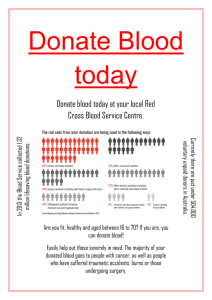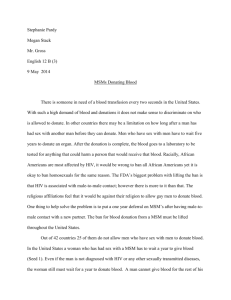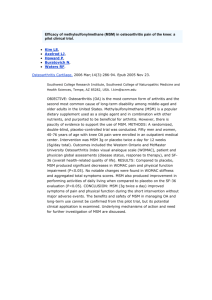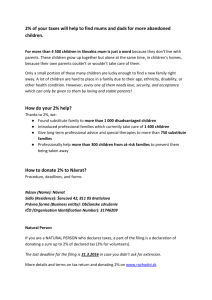Final Argumentative Essay
advertisement
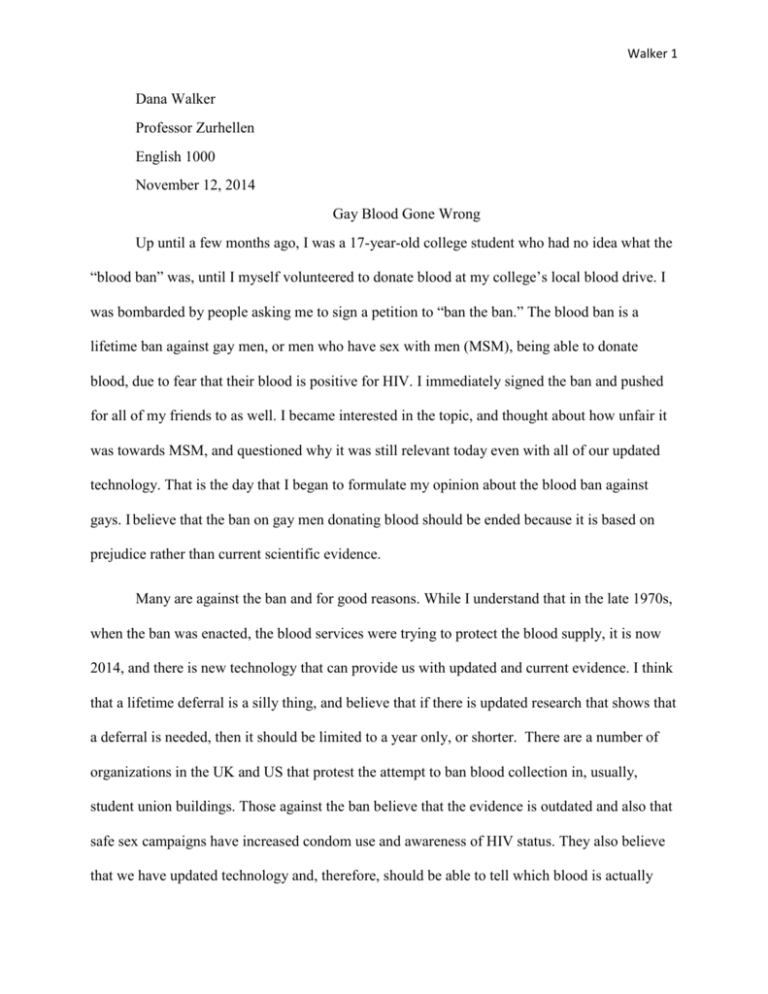
Walker 1 Dana Walker Professor Zurhellen English 1000 November 12, 2014 Gay Blood Gone Wrong Up until a few months ago, I was a 17-year-old college student who had no idea what the “blood ban” was, until I myself volunteered to donate blood at my college’s local blood drive. I was bombarded by people asking me to sign a petition to “ban the ban.” The blood ban is a lifetime ban against gay men, or men who have sex with men (MSM), being able to donate blood, due to fear that their blood is positive for HIV. I immediately signed the ban and pushed for all of my friends to as well. I became interested in the topic, and thought about how unfair it was towards MSM, and questioned why it was still relevant today even with all of our updated technology. That is the day that I began to formulate my opinion about the blood ban against gays. I believe that the ban on gay men donating blood should be ended because it is based on prejudice rather than current scientific evidence. Many are against the ban and for good reasons. While I understand that in the late 1970s, when the ban was enacted, the blood services were trying to protect the blood supply, it is now 2014, and there is new technology that can provide us with updated and current evidence. I think that a lifetime deferral is a silly thing, and believe that if there is updated research that shows that a deferral is needed, then it should be limited to a year only, or shorter. There are a number of organizations in the UK and US that protest the attempt to ban blood collection in, usually, student union buildings. Those against the ban believe that the evidence is outdated and also that safe sex campaigns have increased condom use and awareness of HIV status. They also believe that we have updated technology and, therefore, should be able to tell which blood is actually Walker 2 infected. The National AIDS Trust is one of the opponents against the ban. They do not believe that the evidence is accurate and are not convinced of the arguments for a permanent deferral. It is stated that there would be an estimated 2% increase in donations if the UK moved to a one year deferral for MSM (Hurley, 570). Many gay men would donate blood if able to, thereby increasing the overall percentage of blood supply, which would be greatly beneficial for blood transfusions. Because of the ban, many gays will bring allies to a blood drive to donate for them since they are not allowed. This is known as the National Gay Blood Drive. It is a nationwide donation and protest campaign to help bring awareness to a problem that they feel is not understood. College students are among the many that donate and begin a pattern of lifelong donations. Many college students recognize the ban as unfairly discriminatory and refuse to support it. The American Blood Center, which collects around half of the blood in the U.S., has stated that many centers are not able to collect blood, particularly in colleges and other environments, “because of a perception that we are being unfair” (Roehr, 573). They are not able to collect the blood because college students protest against it and will not donate their blood. I support the decision of those college students who are trying to make a change. At the next blood drive hosted at Appalachian, I will be a supporter of banning the ban and make sure information about it is spread. All around the world, and in the US, there are many MSM who wish they were able to donate their blood in order to save the lives of others. Just one donation of blood at an American Red Cross Blood Drive will help save three lives. Sam Gazy is currently one of the many MSM who are not allowed to donate blood and help the lives of others. Gazy’s father had two kidney transplants, therefore, donating blood is important to Gazy because his father would not be here today without donated blood. Gazy brings a couple of friends to the National Gay Blood Drive to Walker 3 donate in his place since he is not allowed. At this blood drive, many gay men fill out the paperwork to donate blood but are denied after answering yes to the question “Have you ever had sex with a male?” The organizers then send this paperwork to the FDA along with postcards written by the gay men with statements about to why they want to donate. The MSM write these postcards in hope that the FDA will see how many are willing and wanting to donate if they were allowed to. Ryan James Yeznak is another MSM who has felt the inhumanity of the ban, and was the man who started the National Gay Blood Drive. He was the only one out of his co-workers who was not able to donate blood to the tornado victims three years ago. “It completely alienated me from the rest of my coworkers, and I felt like a different species,” says Yeznak, who has created a documentary on the topic. “We have enough [gay and bisexual men] to contribute to the offset of blood shortages” (Sifferlin, 2014). Along with Gazy and Yeznak is Robert Valadez, a writer. He was unaware of the policy, like many others, until he and a large group of friends went to donate and, instead of being taken to give blood, were escorted to go talk to a phlebotomist. He was informed that his blood would not be taken because he had checked yes for the question asking if he had sex with a man since the 1970s, even though it had only been with one man and condoms were always used. “I felt like a walking contagion. Shamed and confused, I couldn't figure out where I had erred. I followed the rules of a progressive sexual mantra: I waited until I was "ready" to have sex, and I always used a condom. Was I now being judged by some archaic moral code?” (Valadez, np) Now, imagine thousands of other MSM feeling this same way or worse because they are denied the chance to donate blood. This ban is a permanent policy against MSM, even those who test negative for HIV and practice safe sex or monogamous relationships. However, if a heterosexual person has sex with a partner who is HIV-positive, he or she is eligible to donate blood after only 12 months. This is not a fair Walker 4 regulation and demonstrates the prejudice against MSM. There are thousands of MSM who feel just like Valadez, discriminated against because of the people they are. As with any argument, there are two sides to every story, and there are many people that support the MSM blood ban. Those for the ban say that by not allowing MSM to donate blood, they are protecting the blood supply from some currently unknown pathogen. “The Terrence Higgins Trust, the UK's largest HIV and sexual health charity, says that the policy is justifiable and sensible and is "first and foremost a public health issue." But it says that to lessen accusations of homophobia the National Blood Service should improve the quality of its communication” (Hurley, 569). The right of recipients to receive safe blood should trump the asserted rights of donors to give blood. “The primary if not exclusive responsibility of blood collection centers and transfusion services is to provide adequate amounts of safe blood to recipients” (Brooks, 573). This is the belief and main argument for many of those that support the ban. Recently, some developed countries have started to lift the lifetime deferral bans and limit it to a period of five years, or even one. However, this is only the case in a small number of countries, the U.S. not being one of them. Currently in the U.S. and other countries that have kept the lifetime deferral, the ban applies even to those men who have only had sex once, even if it happened years ago, and involved only oral sex. The ban was established in 1977, around the time of the AIDS pandemic, at which time it was important that the donated blood supply be kept free from infections, such as HIV. Since then, developed countries such as the UK, France, Italy, Canada, and the United States all have kept the lifetime deferral against MSM. Spain, in the 1990s, switched from excluding just gay men, to everyone who participated in promiscuous sexual behavior. Anyone who has had more than one sexual partner in the past six months is Walker 5 excluded from donating blood. New Zealand has been talking about a deferral of five years, however right now they are not accepting donations from MSM within the past 10 years. Australia has a one-year deferral for MSM, as well as asking specific questions about their sexual history. The information that is used to propel the lifetime ban is based on “statistical modeling published five years ago that concluded that removing the exclusion might result in a fivefold increase in the risk of HIV infected blood entering the blood supply” (Hurley, 569). It is predicted by researchers that changing deferral to one year from the last homosexual contact would increase the risk by 60%, (Hurley, 569). However, the researchers have admitted that many assumptions were made in the modeling, and the accuracy of the estimates is uncertain, but no further details are provided as to what these assumptions were. Current and up-to-date research is needed and necessary in order to prove that the lifetime ban is needed. New insight and knowledge exists about HIV transmission and detection as well as about the sexual behavior of MSM; therefore, a lifetime ban should not be the answer. The American Medical Association voted to end the ban because they recognized that there is new technology to detect HIV in donated blood, and called the ban discriminatory and not based on sound science. In order to make a sound decision about the blood donation ban against MSM, there needs to be clear scientific evidence. The current news regarding the blood ban in the U.S.is that, for the first time, a federal advisory committee has offered to soften the ban on MSM donating blood. “Under the new recommendations, made by the U.S. Health and Human Services' Advisory Committee on Blood and Tissue Safety and Availability, gay men would be able to donate blood after a year of abstinence” (Horowitz, np). Right now, however, the ban still states that if a man has had sex with another man, he is banned for life from donating blood. If the deferral were limited to one Walker 6 year of abstinence, it would still prevent two men in a committed monogamous relationship from donating blood. The Gay Blood Drive believes that this new proposition is a giant step in the right direction, but others, like the Human Rights Campaign, think differently. They believe that the ban should be completely abolished and that the changes do not go far enough. "This recommendation -- although nominally better than the existing policy -- falls far short because it continues to stigmatize gay and bisexual men, preventing them from donating life-saving blood based solely on their sexual orientation, HRC Government Affairs director David Stacey said” (Horowitz, np). This step toward softening the policy is promising for MSM in the U.S., however, it does not solve the problem. I believe that the most important thing to understand about this topic is that it is now 2014 and there need to be clearer answers on why MSM cannot donate blood. Prejudice has been a consistent problem throughout years, and this is a case where action needs to be taken. Gays face discrimination on a daily basis. This is one more problem that they have to face--they are not even allowed to donate blood and help save lives. For many of us, while we may not choose to donate blood, we at least have the option to. MSM do not even have the ability or access to donate their blood and help out. If the lifetime ban were lifted, every gay man might not run to donate his blood, however, at least he would have the option. Those who want to give back, but cannot, would finally be able to help save lives, just like anyone else. Until new scientific evidence is discovered that proves why a lifetime deferral is needed against MSM donating blood, I believe this to be an act of prejudice that needs to be addressed and stopped. Walker 7 Works Cited Bob Roehr and Jay P. Brooks. “Should Men Who Have Ever Had Sex with Men Be Allowed to Give Blood?” BMJ: British Medical Journal, Vol. 338, No. 7694 (Mar. 7, 2009), pp. 572573. Web. 19 Nov. 2014. Horowitz, Alana. "Gay Blood Ban Could Be Significantly Reduced In The U.S." The Huffington Post. TheHuffingtonPost.com, 13 Nov. 2014. Web. 19 Nov. 2014. Richard Hurley. “Bad Blood.” BMJ: British Medical Journal, Vol. 338, No. 7694 (Mar. 7, 2009), pp. 568-570. Web. 19 Nov. 2014. Sifferlin, Alexandra. "National Blood Drive Protests Ban on Gay Men." Time. Time, 11 July 204. Web. 19 Nov. 2014. Valadez, Robert. "A Donor Deferred: The Lifetime Ban on Blood Donations from Gay Men." The Huffington Post. TheHuffingtonPost.com, 14 Oct. 2011. Web. 19 Nov. 2014.
